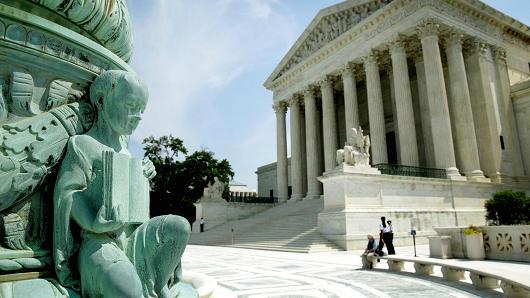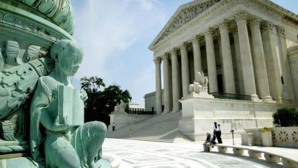The Supreme Court of the United States of America showed its consent in taking up a case which has the potential to weaken the “public sector unions”. The state of California’s requirements of non-union public school teachers’ payment that equals the union dues put a challenge in motion as a violation of free speech rights of the non-members.
The teachers want the court to overturn a “decades-old practice”, which allows the public sector unions to collect fees from non-union workers as long as the money isn’t utilised for political activities.
The case has surfaced in a time when Republican politicians have taken on “public and public sector unions”, which is generally associated with Democrats. One of the most notable Republicans in this endeavour has to be the Governor of Wisconsin, Scott Walker, who in the year of 2011 signed a law limiting “collective bargaining rights for state workers”.
Democrat Kamala Harris, the California’s Attorney General, in tandem with unions backed by the California Teachers Association, had requested the court “not to hear the case”.
On the Supreme Court’s decision, Unions released a statement, saying:
"We are disappointed that the Supreme Court has chosen to take a case that threatens the fundamental promise of America - that if you work hard and play by the rules you should be able to provide for your family and live a decent life".
This case gives the justices a chance by upending a precedent of a significant labour law judgement which was in practice from the year of 1977. In the case of Abood versus the “Detroit Board of Education”, the high court had ruled that “such payments” from non-union members to the unions, was not a violation of the U.S. “Constitution's First Amendment free-speech guarantee”, as non-members would benefit from collective bargaining, without any extra costs on their part.
Certain members from the “conservative wing” of the Supreme Court, which includes Justice Samuel Alito, have “criticized the precedent”. According to the “libertarian think-tank” of Cato Institute, the said case would affect over “7 million public sector employees” who come under the “collective bargaining agreements” which would cover “more than 20 states”.
Representative of the plaintiffs is the non-profit law firm, The Center for Individual Rights, which “welcomed” the Supreme Court’s action, whereby the president of the group, Mr. Terry Pell said:
"This case is about the right of individuals to decide for themselves, whether to join and pay dues to an organization that purports to speak on their behalf. We are seeking the end of compulsory union dues across the nation on the basis of the free speech rights guaranteed by the First Amendment".
The public school teachers who aren’t associated with unions also need to “pay a fee equal to union dues”, which is apparently covered under the "agency-shop" system of California. However, later on the non-members have the right to “seek a refund” of the partial amount that the union claimed from them in order to use the amount to meet the expenses of the union like “lobbying” and other such ventured which are “unrelated to collective bargaining or contract administration”.
The Supreme Court gave a 5-4 ruling in a 2012 case indicating that the Abood and succeeding cases have infringed upon the First Amendment Rights of non-members. Moreover, sometimes in last year, the court refused to “extend” the precedent of Abood which includes the “Illinois home-health workers”. Consequently, a group of teachers “sued the unions” in the following year, whereby they claimed that the “‘agency-shop’ system violated their free speech rights”. Nevertheless, following the high court’s verdict in favour of the union, the said group of teachers came forward to appeal in the Supreme Court.
References:
http://www.reuters.com/article/2015/06/30/us-usa-court-unions-idUSKCN0PA1PD20150630
The teachers want the court to overturn a “decades-old practice”, which allows the public sector unions to collect fees from non-union workers as long as the money isn’t utilised for political activities.
The case has surfaced in a time when Republican politicians have taken on “public and public sector unions”, which is generally associated with Democrats. One of the most notable Republicans in this endeavour has to be the Governor of Wisconsin, Scott Walker, who in the year of 2011 signed a law limiting “collective bargaining rights for state workers”.
Democrat Kamala Harris, the California’s Attorney General, in tandem with unions backed by the California Teachers Association, had requested the court “not to hear the case”.
On the Supreme Court’s decision, Unions released a statement, saying:
"We are disappointed that the Supreme Court has chosen to take a case that threatens the fundamental promise of America - that if you work hard and play by the rules you should be able to provide for your family and live a decent life".
This case gives the justices a chance by upending a precedent of a significant labour law judgement which was in practice from the year of 1977. In the case of Abood versus the “Detroit Board of Education”, the high court had ruled that “such payments” from non-union members to the unions, was not a violation of the U.S. “Constitution's First Amendment free-speech guarantee”, as non-members would benefit from collective bargaining, without any extra costs on their part.
Certain members from the “conservative wing” of the Supreme Court, which includes Justice Samuel Alito, have “criticized the precedent”. According to the “libertarian think-tank” of Cato Institute, the said case would affect over “7 million public sector employees” who come under the “collective bargaining agreements” which would cover “more than 20 states”.
Representative of the plaintiffs is the non-profit law firm, The Center for Individual Rights, which “welcomed” the Supreme Court’s action, whereby the president of the group, Mr. Terry Pell said:
"This case is about the right of individuals to decide for themselves, whether to join and pay dues to an organization that purports to speak on their behalf. We are seeking the end of compulsory union dues across the nation on the basis of the free speech rights guaranteed by the First Amendment".
The public school teachers who aren’t associated with unions also need to “pay a fee equal to union dues”, which is apparently covered under the "agency-shop" system of California. However, later on the non-members have the right to “seek a refund” of the partial amount that the union claimed from them in order to use the amount to meet the expenses of the union like “lobbying” and other such ventured which are “unrelated to collective bargaining or contract administration”.
The Supreme Court gave a 5-4 ruling in a 2012 case indicating that the Abood and succeeding cases have infringed upon the First Amendment Rights of non-members. Moreover, sometimes in last year, the court refused to “extend” the precedent of Abood which includes the “Illinois home-health workers”. Consequently, a group of teachers “sued the unions” in the following year, whereby they claimed that the “‘agency-shop’ system violated their free speech rights”. Nevertheless, following the high court’s verdict in favour of the union, the said group of teachers came forward to appeal in the Supreme Court.
References:
http://www.reuters.com/article/2015/06/30/us-usa-court-unions-idUSKCN0PA1PD20150630






